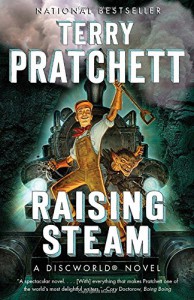Currently reading
Raising Steam (Discworld #40, Moist von Lipwig #3)

Once it had been a dream, it had been nearly realized before being abandoned, and many lost their lives looking to harness it until one young man succeeded. Raising Steam is the penultimate book of Terry Pratchett’s Discworld series, as Moist von Lipwig helps along the technological marvel of locomotion created by Dick Simnel that is monetarily supported by Harry King and pushed by Lord Vetinari early on especially to reach Uberwald which becomes imperative as the Dwarfs verge on civil war.
Young Dick Simnel saw his father killed while trying to control steam, but after years of reading and later technological tinkering he succeeded in creating a locomotive engine and a means to use it on rails. Dick then heads to Ankh-Morpork and the wealthy Harry King to get support, which the latter is happy to do. Soon train fever hits Ankh-Morpork and Lord Vetinari calls on Moist von Lipwig to utilize the invention to the betterment of the city, in no uncertain terms. Like always Moist’s mind begins seeing the possibilities in the new technology and begins helping Dick and Harry come up and implement ideas, but soon Vetinari begins pressing Moist to get things moving faster. All the while, dwarf society is splitting between fundamentalist and pragmatists resulting in attacks on such technological marvels as the clacks and the new railway. Then after the fundamentalists launch a coup when the Low King is at summit, it is only with the railway that the “King” is able to return to put down the coup and change dwarf society.
While I enjoyed the character of Moist in his previous two books, this book was not really a Moist von Lipwig book though he was the main point-of-view. In fact this book very much needed the reader to know the events that happened Thud! and Snuff, which were both Watch driven books especially as Sam Vimes featured heavily in the latter part of the book. The story was not bad, but the twists and turns were predictable and some random scenes were in fact plain random as they never played in the overall plot of the book. There was a hint of Pratchett attempting to make a commentary on religious fundamentalism with the acts of terror, but because of political climate of the time he wrote he watered it down a lot. However, the biggest drawback is that the humor was lacking especially as Pratchett included every person or group that have been featured prominently in the series, save the Witches, almost as if he wanted to show them on last time just in case.
Raising Steam is not the worst Discworld book—Eric—and it is close to being one of the best. Honestly, the story is fine, but seems to take longer than necessary. In previous books the reader could forgive this fact because of the great humor, but as stated before that is lacking. This book is for long time Pratchett fans and anyone interested in getting into Discworld is encouraged to find an book in the first three-quarters of the series to read first and work their way to this one.





 5
5
